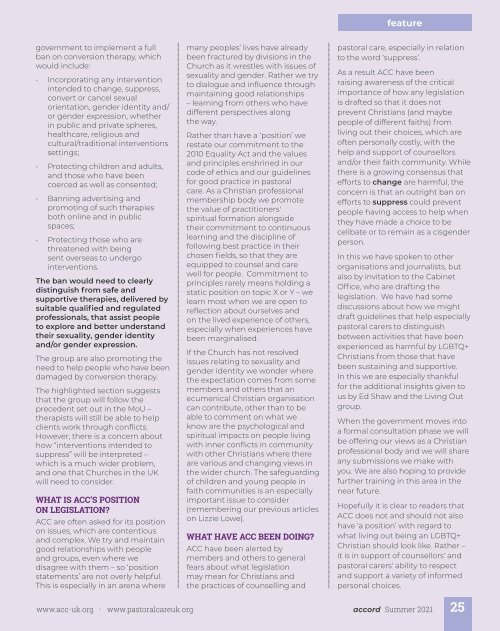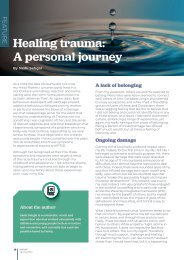ACC Accord Summer 2021 Issue 111
You also want an ePaper? Increase the reach of your titles
YUMPU automatically turns print PDFs into web optimized ePapers that Google loves.
feature<br />
government to implement a full<br />
ban on conversion therapy, which<br />
would include:<br />
• Incorporating any intervention<br />
intended to change, suppress,<br />
convert or cancel sexual<br />
orientation, gender identity and/<br />
or gender expression, whether<br />
in public and private spheres,<br />
healthcare, religious and<br />
cultural/traditional interventions<br />
settings;<br />
• Protecting children and adults,<br />
and those who have been<br />
coerced as well as consented;<br />
• Banning advertising and<br />
promoting of such therapies<br />
both online and in public<br />
spaces;<br />
• Protecting those who are<br />
threatened with being<br />
sent overseas to undergo<br />
interventions.<br />
The ban would need to clearly<br />
distinguish from safe and<br />
supportive therapies, delivered by<br />
suitable qualified and regulated<br />
professionals, that assist people<br />
to explore and better understand<br />
their sexuality, gender identity<br />
and/or gender expression.<br />
The group are also promoting the<br />
need to help people who have been<br />
damaged by conversion therapy.<br />
The highlighted section suggests<br />
that the group will follow the<br />
precedent set out in the MoU –<br />
therapists will still be able to help<br />
clients work through conflicts.<br />
However, there is a concern about<br />
how “interventions intended to<br />
suppress” will be interpreted –<br />
which is a much wider problem,<br />
and one that Churches in the UK<br />
will need to consider.<br />
WHAT IS <strong>ACC</strong>’S POSITION<br />
ON LEGISLATION?<br />
<strong>ACC</strong> are often asked for its position<br />
on issues, which are contentious<br />
and complex. We try and maintain<br />
good relationships with people<br />
and groups, even where we<br />
disagree with them – so ‘position<br />
statements’ are not overly helpful.<br />
This is especially in an arena where<br />
many peoples’ lives have already<br />
been fractured by divisions in the<br />
Church as it wrestles with issues of<br />
sexuality and gender. Rather we try<br />
to dialogue and influence through<br />
maintaining good relationships<br />
– learning from others who have<br />
different perspectives along<br />
the way.<br />
Rather than have a ‘position’ we<br />
restate our commitment to the<br />
2010 Equality Act and the values<br />
and principles enshrined in our<br />
code of ethics and our guidelines<br />
for good practice in pastoral<br />
care. As a Christian professional<br />
membership body we promote<br />
the value of practitioners'<br />
spiritual formation alongside<br />
their commitment to continuous<br />
learning and the discipline of<br />
following best practice in their<br />
chosen fields, so that they are<br />
equipped to counsel and care<br />
well for people. Commitment to<br />
principles rarely means holding a<br />
static position on topic X or Y – we<br />
learn most when we are open to<br />
reflection about ourselves and<br />
on the lived experience of others,<br />
especially when experiences have<br />
been marginalised.<br />
If the Church has not resolved<br />
issues relating to sexuality and<br />
gender identity we wonder where<br />
the expectation comes from some<br />
members and others that an<br />
ecumenical Christian organisation<br />
can contribute, other than to be<br />
able to comment on what we<br />
know are the psychological and<br />
spiritual impacts on people living<br />
with inner conflicts in community<br />
with other Christians where there<br />
are various and changing views in<br />
the wider church. The safeguarding<br />
of children and young people in<br />
faith communities is an especially<br />
important issue to consider<br />
(remembering our previous articles<br />
on Lizzie Lowe).<br />
WHAT HAVE <strong>ACC</strong> BEEN DOING?<br />
<strong>ACC</strong> have been alerted by<br />
members and others to general<br />
fears about what legislation<br />
may mean for Christians and<br />
the practices of counselling and<br />
pastoral care, especially in relation<br />
to the word ‘suppress’.<br />
As a result <strong>ACC</strong> have been<br />
raising awareness of the critical<br />
importance of how any legislation<br />
is drafted so that it does not<br />
prevent Christians (and maybe<br />
people of different faiths) from<br />
living out their choices, which are<br />
often personally costly, with the<br />
help and support of counsellors<br />
and/or their faith community. While<br />
there is a growing consensus that<br />
efforts to change are harmful, the<br />
concern is that an outright ban on<br />
efforts to suppress could prevent<br />
people having access to help when<br />
they have made a choice to be<br />
celibate or to remain as a cisgender<br />
person.<br />
In this we have spoken to other<br />
organisations and journalists, but<br />
also by invitation to the Cabinet<br />
Office, who are drafting the<br />
legislation. We have had some<br />
discussions about how we might<br />
draft guidelines that help especially<br />
pastoral carers to distinguish<br />
between activities that have been<br />
experienced as harmful by LGBTQ+<br />
Christians from those that have<br />
been sustaining and supportive.<br />
In this we are especially thankful<br />
for the additional insights given to<br />
us by Ed Shaw and the Living Out<br />
group.<br />
When the government moves into<br />
a formal consultation phase we will<br />
be offering our views as a Christian<br />
professional body and we will share<br />
any submissions we make with<br />
you. We are also hoping to provide<br />
further training in this area in the<br />
near future.<br />
Hopefully it is clear to readers that<br />
<strong>ACC</strong> does not and should not also<br />
have ‘a position’ with regard to<br />
what living out being an LGBTQ+<br />
Christian should look like. Rather –<br />
it is in support of counsellors' and<br />
pastoral carers' ability to respect<br />
and support a variety of informed<br />
personal choices.<br />
www.acc-uk.org • www.pastoralcareuk.org accord <strong>Summer</strong> <strong>2021</strong><br />
25



